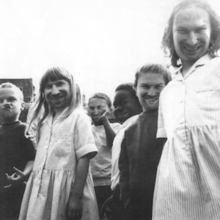Come to Daddy (song)
"Come to Daddy" is a song by British electronic music producer Richard D. James, released under his main pseudonym Aphex Twin. It was released as the lead single from his seventh extended play of the same name on 6 October 1997. A music video for the song was released, which later became infamous for its content. It did, however, get ranked at number one on Pitchfork's Top 50 Music Videos of 1997 list. In October 2011, NME placed the song at number 42 on its "150 Best Tracks of the Past 15 Years" list.[2] The song peaked at number 10 on this Danish Singles Chart and number 36 on the UK Singles Chart.
Background
James describes his work like this: "Come to Daddy came about while I was just hanging around my house, getting pissed and doing this crappy death metal jingle. Then it got marketed and a video was made, and this little idea that I had, which was a joke, turned into something huge. It wasn't right at all."[3]
Music video
The music video for "Come to Daddy" (released in October 1997) was directed by Chris Cunningham and filmed on the same council estate where Stanley Kubrick shot many scenes in A Clockwork Orange.[4] The scene is shot around Tavy Bridge Shopping centre, Thamesmead, which was demolished in 2007.[4] Much of the dark underground car parking is now gone. The video opens with an old woman walking a dog in a grimy, industrial setting. The dog urinates on an abandoned television lying on the pavement, causing it to sputter unexpectedly into life, and a distoted and warping headshot of Richard D. James chants the lyrics. This unleashes a spirit, accompanied by a gang of small children, all of whom bear James' grinning face and who appear to inhabit the abandoned buildings. The children go around wreaking havoc, trashing an alley and chasing a man into his car. The thin man (played by Al Stokes[5]) emerges from the television, screams in the woman's face, then gathers the children around him. It is the only music video in the top 50 of The 100 Greatest Scary Moments as voted by Channel 4 viewers in 2003.[6] The video is included on the Directors Label volume, The Work of Director Chris Cunningham.[7] The video was also named the number one video of the 1990s by Pitchfork.[8]
Track listing
| 1. |
"Come to Daddy" (Pappy Mix) |
4:21 |
| 2. |
"Flim" |
2:57 |
| 1. |
"Bucephalus Bouncing Ball" |
5:45 |
| 2. |
"Come to Daddy" (Little Lord Faulteroy Mix) |
3:50 |
Charts
References
External links
|
|---|
|
| As Aphex Twin | | Studio albums | |
|---|
| | EPs | |
|---|
| | Singles | |
|---|
| | Compilations | |
|---|
| | Promotionals | |
|---|
|
|---|
|
| As AFX | |
|---|
|
| As The Tuss | |
|---|
|
| As Polygon Window | |
|---|
|
| As Power-Pill | |
|---|
|
| As Bradley Strider | |
|---|
|
| As Caustic Window | |
|---|
|
| As GAK | |
|---|
|
| As Mike & Rich | |
|---|
|
| Universal Indicator | |
|---|
|
| Unreleased | |
|---|
|
| Related articles | |
|---|
